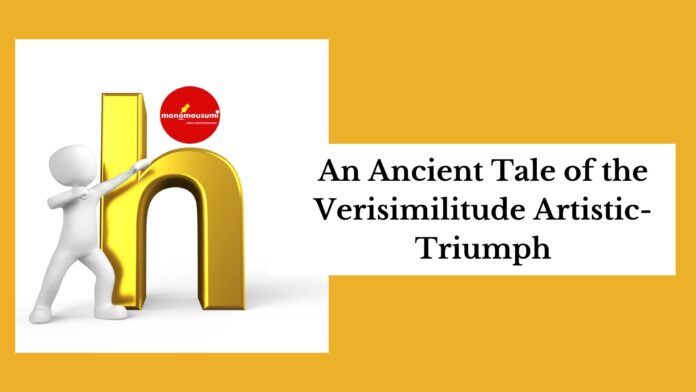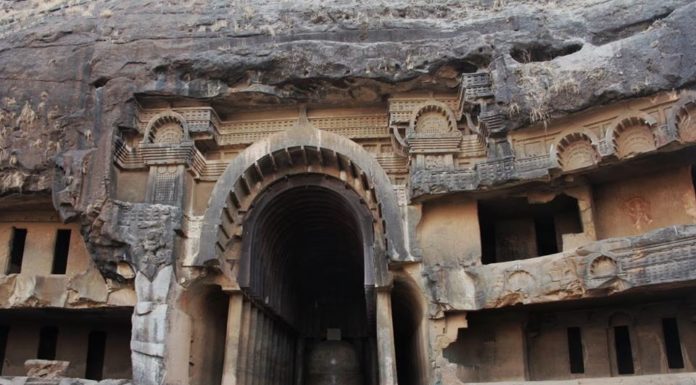Recollection and Retelling of a Lost World-Rapture
ANCIENT GREECE, a nation of artists, was one of the richest empires in Art. Zeuxis, a best known innovative Greek master-painter, flourished around the 5th century BCE; the most influential artistic period of Greek culture, and relatively a sophisticated era in world history.
He was the pride and boast of Athens, and thrice he had been crowned victor at the Panathenaic Games. The dwellings of the rich and noble, and the shrines and temples of Gods were decorated with the fruits of his genius. He was courted by the wise and powerful. Admirers, Artists and Magi came from different distant cities to look upon the Athenian painter, whose name sounded world-wide. Even the proud ruler of Almyra, the “Tadmor of the wilderness” sent a deputation of nobles to invite his presence at the palmyrene court.
Contemporary artists acknowledged his superiority; and Apolodorus, father of the Athenian painters, declared that “Zeuxis had stolen the cunning from all the rest.” Thus flattered and caressed, Zeuxis became proud and haughty. He found no rival, for he knew no equal.
During the Panathenaic games, the Agonothetai employed him to paint a wrestler or champion to adorn the Peristylium of the Gymnasia. Assembled thousands gave a simultaneous shout of applause when the Picture was exhibited on the first day of the games. The victors of the chariot race, the discus, the cestus and the athletes, were almost forgotten amid the general admiration of the picture of Zeuxis. Conscious of his superiority, the artist, with pedantic egotism, wrote beneath his picture, “invisurus aliquis facilius quam imitatarus”-“Sooner envied than equaled.”
The inscription met the eye of an obscure youth, who believed it not and resolved to prove its falsity.
The third day of the games had terminated. The last rays of the sun yet lingered upon the Acropolis, and burnished the crest of hoary Olympus that gleamed in the distance. Zeuxis sat alone with his wife and daughter, listening attentively to the strains of minstrel who swept the lyre for joyous dancers assembled near the grove sacred to the psyche. As the music ceased, a deep sigh escaped the daughter, and a tear trembled in the maiden’s eye.
“Cassandra, my sweet Cassandra,” said Zeuxis, “why that tear, that sigh?” A deep crimson suffused the cheeks of the maiden, but her lips moved not and she was silent.
“Tell me Cassandra,” said the father affectionately placing her hand in his own, and inquisitively eying the blushing damsel; “Tell me what new grief makes sorrowful the heart of my daughter? Thinkest thou yet of the worthless Parrhasius-even now, upon the eve of thy nuptials with noble Thearchus?”
“Nay, my dear father,” musingly Cassandra responded, “it was the music that made me weep. It awakened memory to the recollection of the many happy hours spent with my dear Portia, who is now among the immortals. Four years ago we danced together to the same strain, and the lyre was touched by the gentle Parrhasius.”
“Gentle Parrhasius, sayest thou Cassandra? Gentle Parrhasius! Wouldst thou call him gentle, the poor plebeian who sought to rival the noble Thearchus in thy affections?-Who openly avowed in the streets of Athens, in the Gymnasium and the Hippodrome, that his pencil would yet make Zeuxis envious?”
“And yet he was gentle,” replied Cassandra mildly, while the big round tears coursed down her cheeks, and her bosom swelled with the tender emotions of pure affection.
The brow of Zeuxis lowered, and indices of whirl-wind passion were in his countenance. Four years had elapsed since Parrhasius had asked his daughter in marriage, and was indignantly refused. Affection, deep and abiding as vitality itself, existed between the young painter and Cassandra-affection based upon reciprocal appreciation of mutual worth; but the ambition of Zeuxis made him forget his duty to his child and without estimating consequences, he resolved to wed her to Thearchus, a wealthy Athenian nobleman, and son of one of the judges of the Areopagus. When Parrhasius modestly but firmly pressed his suit, Zeuxis became indignant-taunted him with his plebeian birthright and obscure lineage; and denounced him as a poor Ephesian boy, unworthy, because of his poverty, the friendship much less the confidence of son ship, of the Athenian great painter.
The spirit of Parrhasius was aroused, and, standing erect in all the dignity of conscious equality of genius, full-fledged and eager to soar, with his violent heart; he boldly repelled the insults of Zeuxis, with a voice that reached the listening ear of his beloved, exclaimed-“Know proud man, that thou, the unrivalled master of Greece, of the world, will yet envy the talent and fame of Parrhasius”.
The rage of Zeuxis was unbounded, and he ordered his helot to thrust the youth from his presence. The order was instantly obeyed; and ere setting off the sun, Parrhasius left the walls of Athens behind him, and turned towards Ephesus, to practice his skill in seclusion over there.
During the interim of the games, the young painter assiduously and extensively practiced his art, in utter seclusion from the world and those who knew him before departing from Athens believed him dead. Nor could Cassandra during these four years, hear aught of her exiled lover. Her constancy and hope whispered to her heart the fulfillment of the prediction of excellence, and that destiny would yet unite them in holy ties by its mysterious web. This hope and constancy had thus far delayed her marriage with Thearchus. Like Penelope, she framed reasons for repelling her suitor, and daily looked for the return of her Lord, wearing the bay of success.
Her father, wearied by procrastination, and ambition for display, had resolved to have the nuptials celebrated during the festival of Panathenaea. His persuasions became commands, his arguments positive orders, and his paternal government by the power of love, a stern executor of the behests of his ambition. The herald had already sounded the proclamation, and all Athens greeted with joy the approaching nuptials of the noble Thearchus and lovely Cassandra. Yet the stern ambition of Zeuxis was susceptible to tender impressions. He adored his daughter, and her tears melted in the ice of his heart. He knew she loved the Ephesian, and the war of duty and ambition waxed warm as he witnessed new proofs of her constancy and love.
“Come, come, Cassandra” said he caressingly, “these tears ill become the daughter of Athenian painter on the eve of her nuptials with one of the noblest sons of Greece. Forget the childish passion that attaches Thee to parrhasius, and thank the gods for his exile from Athens.”
“Would you like to see your Cassandra happy?” The weeping maiden asked.
“I would indeed,” replied Zeuxis; “and it was for her happiness that I spurned the Ephesian and favored Thearchus.”
“But Thearchus has no place in my affections,” responded Cassandra firmly. “I love him not; and to wed him is but to plunge me into deeper misery! What is wealth?-What is nobility and applause of the people; if the affection of the heart has no participation therein? They are ministers of woe to the broken spirit. Without love, there is no happiness; without happiness, life is nothing worth. I would sooner wed a shepherd than an archon; did he but bring with him the riches of true affection.”
“Madness, madness,” exclaimed Zeuxis. “This philosophy may do for a peasant-maiden, but should not pollute the lips of a daughter of Zeuxis. Talk of love! Why, it is but a passion born of circumstances? Today, it burns with volcanic violence; tomorrow, it is a glimmering taper. To-day its intensity warns the most careless cabin of poverty; to-morrow its flickering rays will barely illuminate the most cheerful abode of wealth. It is a delusive light that too often dazzles the blind.”
“It may be so sensual,” replied Cassandra, “with them, it is indeed a passion of circumstances. Yet, after all, it is not love. It is but a poor semblance of the holy passion. Pure affection comes not from the dross of earth, the wealth, power, and pageantry of individuals or of society, nor from the ephemeral loveliness of the human form. Such is, at best, the counterfeit of love and undeserving its divine name.
When moral and intellectual worth-the beauties and amiability of character-the noble evidence of the exalted genius, excite our admiration, and win our affections for the possessor, and then, indeed do we truly love and love a worthy object. Such, dear father, is my love for Parrhasius. My heart has sealed its troth to Parrhasius: its signature adverse fate cannot efface. Submission to thy will must unite me to Thearchus, whom I cannot love; but the undying flame of first affection will only make me more miserable.”
Zeuxis remained silent. He loved his daughter with exceedingly tenderness; yet burning ambition presented a paramount claim, and would not permit him again to delay the nuptials on which he has resolved. He kissed the tears from Cassandra, and was about to retire for the night; but the maiden seized his hand, and looking imploringly in his face, said:
“Hear me once more, my dear father, ere the decree of my unhappiness shall have irrevocably gone forth. Hope whispers in my ear that the prophetic taunt of parrhasius may yet be verified. Thou well know the genius and the spirit of the youth; and I know thy gentle nature will now forgive him the words spoken in passion. Forgive and Cassandra will be happy.”
“For thy sake,” replied Zeuxis, “I will pardon the rashness of the Ephesian boy. But, why is thy hope? Wouldst thou see thy father rivaled, and the voice of Athens-of the world-loud in praises of others?”
“No,” replied Cassandra, “it is not for that I hope; but thy daughter loves Parrhasius, and she desires to see him worthy of that love in the eyes of her father. This is the foundation of my hope. Is it not just?”
“Truly such an aspiration is worthy of my daughter.” Replied Zeuxis; and again bidding her good night, she was about to depart. But the maiden still clung to his hand. “One word more” she exclaimed; “one more boon and your Cassandra will be completely happy. Promise me that I shall wed Parrhasius, if his prediction be fulfilled.”
“I promise” replied Zeuxis, conscious that her hopes were groundless, and that the last day of the festival would witness the nuptials of Thearchus and Cassandra, and thus crown his paternal ambition with a more valued bay than the laurel of the victor.
On the following morning, Zeuxis prepared for the games. Just at the moment of the starting, a helot approached him with a small roll, directed to: “Zeuxis, the unrivalled painter of Greece.” He was delighted with the flattering superscription, and having unbounded it read:
arrhasius, the plebian boy of Ephesus, to Zeuxis, the great Athenian
Artist, Greetings: Ten days, and the games of Panathenaea will terminate.
On the ninth, I challenge Thee to a trial of skill. The subject is left to the choice of the challenged.
Zeuxis rented the challenge in a thousand pieces, and burning with rage, exclaimed, “Tell your master that Zeuxis stoops not to compete with plebeians. Tell him I trampled his insolent challenge beneath my feet, even as I would crush its author. Begone! Gods, has it come to this!” continued he. “Must I first bear the taunt of that boy, and then, in the face of thousands, have him challenged me to trial. I know him well. if I refuse, a herald will proclaim that refusal in every street of Athens, and the gymnasium and circus will ring with my shame. It must not be.” And he commanded the helot to return.
“Tell your master,” said Zeuxis, “that I accept his challenge: the subject fruit.” The helot departed.
“Now” said Zeuxis, “my triumph will be complete, and Cassandra’s delusion will be broken! Now, I will prove the insolent Ephesian unworthy of my exalted notice and the noble Cassandra’s love. It is well. Destiny bids me stoop to the trial, only for another Laurel to my brow!” Zeuxis, with a haughty step, proceeded to the circus.
Within a few hours, all Athens was in commotion. A new impulse had been given to the popular excitement, and the first sound that fell upon the ear of Zeuxis, as he entered the Circus was the voice of a herald proclaiming that an Ephesian painter had challenged the great artist to a trial of skill.
The voice of the herald also sounded throughout the streets of Athens, and fell like the sweetest symphony upon the ear of Cassandra. Although she knew not the name of the competitor, but the revealing of hope and love assured her that it was none other than Parrhasius. And that hope and that love also gave her assurance that her beloved one would be the victor, and that holy affection rather than proud ambition would be crowned by the hands of Astrea.
A grand pavilion was assigned as the venue for the performance of the contest. Eminent judges were appointed and the day and time for the trial was fixed. All eyes in Athens remained fixed upon the approaching irresistible momentous fray-a mighty victory or a mighty fall.
The day fixed upon for the trial arrived. A charm and ecstasy drew near by the bright arrival of the participants and the esteemed judges. The participants were asked to bring each one of their life’s masterpieces for the trial. Two display units were provided at the stage, where the contenders placed their art of wisdom- artifice of their lore, upon it; like the maps in the school houses intellect hung, forcing wide truth into a narrow scheme. Confident they took up their stupendous charge with a rigorous stare in their creative eyes. A harmonious, delightful and warm ambience was created upon the arena of the pavilion to welcome the large crowd of spectators. The crown (Laurel or Olive wreath) for the victor was displayed on a decorated platform; was radiating like a rapture-flowers paradise. The sun had journeyed half his way towards the meridian, and the thousands, who were congregated in Athens to witness the trial, flowed like a living torrent through the eastern gate of the city. All took up their respective places as assigned. Thus all formal arrangements and preparation for the contest were set ready.
As per time scheduled; the spoke-person of the jury first approached Zeuxis, and said “kindly unveil the curtain from your painting; this is time to see what you have done.” Zeuxis accordingly removed the curtain from his painting. It was an arrested opening. With a penetrating gaze all gasped to see a cluster of grapes depicted so naturally; appeared as real. Astonished, all sat silent for a space. Meanwhile, Zeuxis helped wide-opened all the doors and windows of the pavilion that had been left ajar. As time passed-by; attracted by the verisimilitude effect of the luscious grapes, a flock of birds from the grove came up and flew down and alighted upon the painting; and eagerly sought to devour the pictured-fruit. Suddenly a deafening shout and a cry of “Zeuxis and Athens!” arose from the throng. The decisions of the birds of heaven was deemed sufficient evidence of the superiority of the Athenian painter, and the mesmerized onlookers clamored loudly for the crown of Laurel and the branch of palm for Zeuxis. Zeuxis’s face now wears “a beautiful mask of antique joy,” but the skill of the competitor is yet to be tried.
The spoke-person now turned towards Parrhasius and said, “This is time to see what you may have done; kindly honor us by unveiling the curtain.”
Concealing an essential truth with tact, Parrhasius, truthfully answered in a few chosen words; was sufficient for that crucial and strategic occasion, “There are things that cannot be done.”
The spectators, the members of the jury, and Zeuxis thought; his conscious inferiority had made him shrink from the trial. A change now fell upon the Zeuxis’s mood. A rapture and pathos moved his voice, “we would love to see your goodly affair. Kindly show us.”
With an appropriate pause and steadfast eyes Parrhasius honestly said, “You are looking at it.”
Murmurs of dissatisfaction ran through the crowd, and a few loudly denounced the conduct of Zeuxis in placing the picture beyond their observation by not displaying it.
As the situation became tense, amid this intense drama; the judges demanded an exhibition of the picture of the Ephesian.
Parrhasius, with all due respect politely said, “it would be a great honor for me if the great artist, Zeuxis unveils the curtain from my painting.”
As per request, Zeuxis, without knowing too close a reality; he swiftly made an attempt to remove the curtain. By trying to do so, he realized that, it was not a curtain but the painting of a curtain. Had a thunderbolt fell at the feet of Zeuxis he could not have been more astounded. The curtain was painted upon the tablet, and so exquisitely was it wrought, that even the practiced eye of Zeuxis failed to know the reality. The cosmic panorama unrolled before him, and he realized, he has been surpassed.
And then, he quietly drew close to the decorated platform and with his slow and great hands lifted the crown and moved towards parrhasius. He placed the crown upon Parrhasius’s head and decorated him with the branch of palm as victor. Mounting a pedestal, Zeuxis addressed the members of the jury, and the multitude; “I honestly yield, I have been surpassed. We were not looking at a curtain, but the painting of a curtain. While, my painting; a cluster of grapes, appeared real to the eyes of birds. But, the painting of Parrhasius; a simple curtain appeared real, not only to the eyes of the viewers, but also to the eyes of a professed artist, Zeuxis. Parhasius is certainly worthy to be the victor.” He recounted the love and constancy of Parrhasius and Cassandra and told of his promise; he also tenderly related his engagement with Thearchus.
The convincing pre-judgment of Zeuxis was approved by the judges, and officially also he was declared as the victor.
A fair youth, half enshrouded in a mantle was witnessing the trial with intense anxiety for the result; in the presence of assembled thousands, stepped forth from the pavilion approaching Zeuxis. Her radiant tread glimmered across the floor, as one who comes from a heavenly embassy, a happy wonder in her fathomless gaze, changed by the halo of her love she came; her eyes rich with a shining mist of joy, and delight when every barrier falls, and the transfiguration and the ecstasy. Bounding forward and grasping the hand of Zeuxis, she spoke musingly, “and Thy promise.”
“I shall fulfill it,” said he; “Parrhasius is indeed worthy of my Cassandra. Embrace and be happy!”
Parrhasius humbly bends to receive her, and gathers her into an embrace. The mantle fell from the shoulders of the youth, and Cassandra feels “her being flow into him as in waves a river pours into a mighty sea.” The river has found the sea. The mortal has awakened into eternity. This is the phoenix hour, the time of their ineffable union. They are married already in the eyes of heaven, and the symbol rites take their own course. The names of Parrhasius and Cassandra ran murmuring through the crowd.
Then, Zeuxis was proceeding to vindicate himself from the imputation of treachery to Thearchus, when another thundering shout arose from the assembly, as a noble youth came from the pavilion with a branch of palm, and placed it in the hands of Cassandra. It was Thearchus. He had before heard, and now witnessed the devotion of the lovers, and his generous heart melted at the spectacle. He had tenderly loved the maiden but magnanimously resigned all.
“Laurels for Thearchus!” shouted the multitude and he too, crowned victor, for he had conquered love.
Matrons and virgins strewed the paths of Parrhasius and Cassandra with the flowers as they returned to the city; and on the following day their nuptials were celebrated with the splendor fully adequate to the wishes of the ambitious Zeuxis; for the city made the marriage a high festival in honor of genius and constancy.
The games ended-the city became quiet. A few years of happiness cast their sunlight around the footsteps of the great painter, and he went down into the tomb honored and mourned by a Nation-by the World, wherever his fame was known. His mantle fell upon Parrhasius, who is revered by genius as the greatest painter of antiquity.
By: Ramkrushna Mohanta, Madhuban centre of Sri Aurobindo Ashram Delhi-Branch
Write and Win: Participate in Creative writing Contest and win fabulous prizes.











